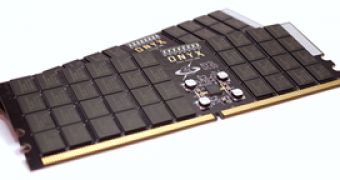Solid state drives managed to deliver a huge performance increase over their platter-based counterparts, but a team at the UC San Diego Jacobs School of Engineering is determined to make these devices a lot faster by using phase-change memory (PCM).
The team, which includes both student and faculty members, plans to showcase the first device of this type on June 7-8 at the DAC 2011 technical conference.
This will be called Moneta, and uses Micron's first-generation PCM chips in order to deliver sequential read speeds of up to 1.1GB/s, while sequential writes are rated at 371MB/s.
When smaller, random files, are being used (512B), the read and write performance of the drive drops to 327MB/s and 91MB/s respectively, but the scientists state that Moneta also features faster access times and lower power requirements than standard NAND Flash SSDs.
PCM memory chips use a special metal alloy called a chalcogenide to store data in its crystal structure.
When data is being written, the PCM memory chips switch the alloy between a crystalline and amorphous state by delivering an electrical current to heat the metal, and when data is being read a smaller current is sent to determine which state the chalcogenide is in.
“As a society, we can gather all this data very, very quickly -- much faster than we can analyze it with conventional, disk-based storage systems,” said Steven Swanson, professor of Computer Science and Engineering and director of the Non-Volatile Systems Lab (NVSL).
“Phase-change memory-based solid state storage devices will allow us to sift through all of this data, make sense of it, and extract useful information much faster.
“It has the potential to be revolutionary,” concluded professor Swanson.
The team hopes that it will be able to build a second-generation Moneta SSD in the next six to nine months and believes that the technology could be ready for the market in just a few years time, if PCM memory continues to improve at a steady pace.
The next Moneta drive could also be significantly faster than the current version of the SSD, as professor Swanson believes the drive could benefit from using more advanced managing software designed especially for PCM memory. (via ScienceDaily)

 14 DAY TRIAL //
14 DAY TRIAL //